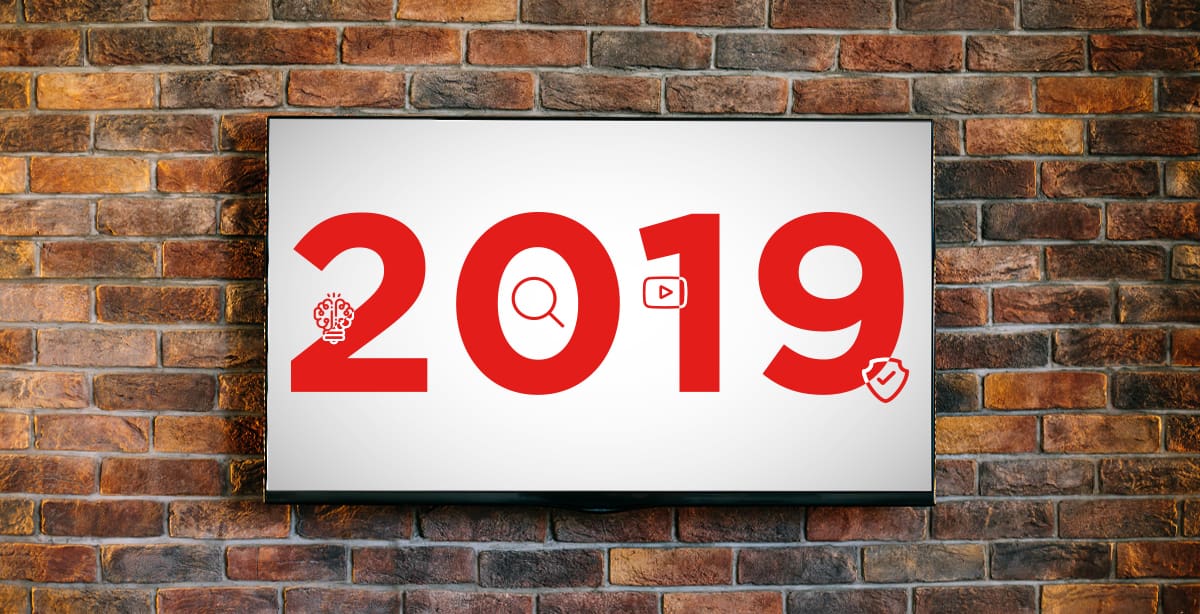
You’ve read that virtual reality is gaining ground, and you know that you needed a mobile-first website like, yesterday, but what are the most pressing points for marketers to consider this year? Consider our top four:
1.) AI is growing in a very real way.
In 2018, marketers everywhere decided it was time to dabble in artificial intelligence (AI) — but 2019 is expected to be the year when more and more brands get it right.
Chatbots are an effective way to achieve every marketer’s dream: Reach the right audience, at the right place, at the right time, and with the right message. Not only does this allow for targeted two-way communication, but it makes fast, responsive customer service available to your audience 24/7.
Some naysayers are concerned that a chatbot could result in a poor user experience. However, recent surveys support that most customers have positive experiences when interacting with chatbots. Plus, these AI messenger systems — specifically Facebook messenger bots — have high click-through rates. Although there are limitations to the capabilities, chatbots are moving full-steam ahead — and it’s time to get on board.
2.) Search is raising its voice.
Approximately one-third of all search queries are voice-based — and that number is estimated to jump to half by 2020. With sophisticated devices driven by virtual assistants like Apple’s Siri, Amazon’s Alexa and Google Assistant leading the way, this stat comes as no surprise.
Voice-recognition technology will only get more sophisticated moving forward, and it’s going to leave a wake of chaos in its midst for unprepared marketers. In 2019, it will be critical to tailor your SEO strategy toward voice search. This means a number of things: For starters, you must consider how your audience speaks, versus what they type.
Overall, high-quality content will be crucial to online success, especially content created with an eye toward how language comes into play with voice search. Copywriters everywhere can rejoice that the days of littering sites with keywords in unnatural places are a thing of the past — conversational copy including key phrases will align more closely with voice search.
3.) Press play on video domination.
Video is no longer something to keep an eye out for — it’s arrived, it’s thriving, and it’s projected to claim more than 80% of all web traffic by 2019. Decreasing attention spans plus the increasing popularity of live videos and video ads equals a strong need for a strategic video content plan. Video offers a unique, effective way to communicate with your audience in a format that is nearly effortless for them to consume.
Plus, Hubspot recently reported that including a video in an email can boost its click-through rate by an astonishing 200 to 300 percent, and that including one on a landing page can increase conversion rate by 80 percent. Of course, context matters deeply in both of these situations.
The most important things about your video are not production quality or cleverness, but the originality and quality of the entertainment or information presented in the video. In other words, is it captivating? Is it delivered when and where your audience wants to consume it?
4.) Keep it real: Authenticity is increasingly important.
Consumers today are more digitally savvy and shrewd than any before them. Why? Because they’ve been totally inundated with blatant self-promotion, crappy content and desperate grabs for attention for a while now. As audiences learn to spot posers, filter through the noise and distrust anything sales-y, it’s more important than ever to pinpoint your true values and sharing THAT story with the world.
That means keeping it real and not trying to “trick” your audience into liking you or purchasing from you. Rather, it’s humanizing the brand and consistently showing up to support your mission with your products, content, sales pitches, etc.
The Brandon Agency’s CEO Scott Brandon explained in a recent blog post what this looks like for brands:
“It means staying true to who you are, what you do, whom you serve and, most importantly, why you do what you do. Being authentic doesn’t mean listening and then spitting back what we hear. It means telling people what we stand for, why we do what we do, and then waiting to see who is attracted to us. This is the key to being authentic.”
By subscribing to our newsletter, you agree to our Privacy Policy.




